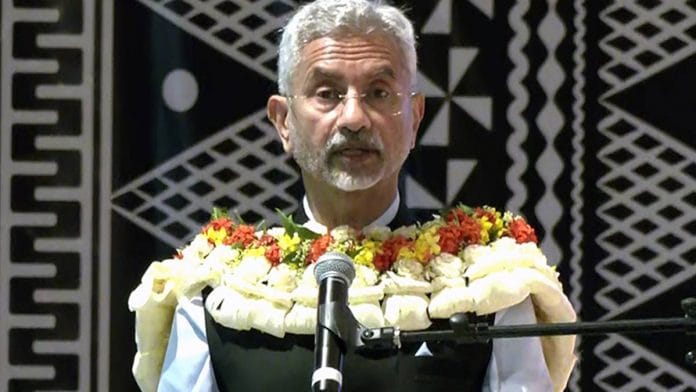New Delhi: India is proactively playing a role in finding diplomatic solutions to both the conflict in West Asia and the Russia-Ukraine war, given that it is one of the few countries that is in touch with all the major parties, Minister of External Affairs S. Jaishankar said during his visit to Australia.
On Sunday, Jaishankar said that there are “two conflicts, which are in everybody’s mind” and “in different ways, we are trying to do something in both”. He was addressing the Indian community in Brisbane, where he also inaugurated India’s fourth consulate in the country Monday.
Speaking at the University of Queensland, he said, “With regard to Ukraine, we feel strongly, not just us, we believe that the 125 countries of the Global South are feeling the distress and pain of this conflict. There has to be some kind of a serious effort to come back to diplomacy. We are making our effort here.”
The EAM added, “The Prime Minister [Narendra Modi] personally is involved in that. He went to Russia in July and then he went to Ukraine in August, he met President [Volodymyr] Zelenskyy separately once in June and once in September, we again had a meeting with President [Vladimir] Putin last month in Kazan.”
Modi is one of the few leaders to have met both Ukrainian President Zelenskyy and Russian President Putin multiple times this year. In June and September, he met with the Ukrainian president on the margins of the G7 summit in Italy and the United Nations Summit of the Future in the US, respectively, while also being the first Indian prime minister to visit Ukraine in August.
In July, Modi travelled to Russia for the annual India-Russia summit, where he held extensive consultations with Putin. During his second visit to the city of Kazan last month for the BRICS summit, he held another bilateral meeting with the Russian president.
Also Read: Jaishankar’s Pakistan visit isn’t sitting well in China
‘Hoping to create common ground’
During the interaction, Jaishankar conceded that India’s early efforts were viewed with a “certain degree of scepticism”, which has since changed due to “the much greater understanding, especially amongst Western countries”.
The Indian external affairs minister said New Delhi’s efforts have the support of the Global South, adding that the countries in this region have also suffered because of the Russia-Ukraine conflict.
“We are hoping that through multiple conversations, we are able to create some common ground so that some beginnings of diplomacy can resume,” said Jaishankar.
The Russia-Ukraine war, which began in February 2022, is fast approaching its third year. Kyiv has, over 2024, attempted to build global support for its peace proposals created on the foundation of Zelenskyy’s 10-point agenda, first outlined during the 2022 G20 summit in Indonesia.
Earlier this year, Switzerland co-hosted a peace summit, which was attended by nearly 90 delegations, including India. However, India opted out of the joint communiqué, saying that peace requires “all stakeholders” to be brought together. Russia was not invited to the summit.
In October, New Delhi opted out of sending any representatives for a National Security Advisers (NSA)-level meeting hosted by Canada in Toronto on Zelenskyy’s plan to end the war because of tensions between the two countries, as ThePrint had reported earlier.
‘Focus on stopping West Asia conflict from spreading’
In West Asia, Jaishankar said, the focus is to prevent the conflict from spreading. Israel’s retaliation for the attacks by Hamas on 7 October, 2023—in which nearly 1,200 Israelis were killed and 250 were taken hostage—has killed at least 43,000 Palestinians in Gaza.
Since then, Tel Aviv has also expanded its efforts to degrade Lebanon’s Hezbollah, succeeding in killing its leader Hassan Nasrallah and several senior leaders, while also squaring off with Iran.
In July, Tel Aviv was accused of being the actor behind the rocket strike that killed Hamas political chief Ismail Haniyeh in Tehran. Since then, Iran and Israel have traded missiles with Tehran warning of retaliation for Tel Aviv’s strikes on its military bases last week.
“Here one of the gaps is the inability of Iran and Israel to talk to each other directly. Different countries are trying to see if they can bridge that gap. We happen to be one of them,” said Jaishankar.
The EAM is in Australia for a five-day visit from 3 to 7 November. He will make a one-day visit to Singapore on 8 November before returning to India.
(Edited by Sanya Mathur)
Also Read: ‘Only Quad can ensure freedom, security in Indo-Pacific,’ says EAM S Jaishankar in Tokyo






